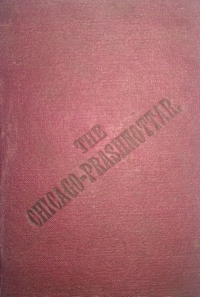58. Question:
If an omniscient and passionless God is not the creator of the world, how has this world sprung up of itself. It is evident nothing is made without a maker just as a clock &c.
Answer:
O, enquirer. You do not seem to fully understand my argument and it is therefore you call God the creator of the world. We also hold that the finished articles that we see were made by someone, for example pot, cloth, clock, house, stall, chain &c, but such things as Sky, Time, Atoms, Soul &c. have not been made by any one. All learned men agree in the view that all things which have the forms of effects must have material causes. Without a material cause no such effect can be produced. Only a fool can say against this view. But soul, time, atoms, and sky have no material causes and are therefore beginningless and none has made them. The statement that all things have been made by God is therefore untenable.
As regards the earth, water, fire, air plants, moving creatures, and such pardons of the earth as heaven, hell, and sun, moon, planets, stars, constellations &c, these are made by the combination of matter and spirit. The earth &c. are eternal by reason of their continuity and non-eternal by their apparent forms.
The matter and spirit embodying them are of infinite potentialities. These eternal forces manifest themselves when combined with their respective causes such as time &c. and all the creation in the world that has been, is and will be, is due to the following five material causes - time, nature, continuity, action and energy. Except these five causes, no other creator or director of the world as God is proved. The line of argument refuting such an assumption has already been explained. A single seed is charged with infinite potentialities. A variety of colours, leaves, roots, fruits, bark, branches, flowers, seeds &c. &c. abide in the seed in potential forms. When the seed is burned to ashes, its potential forces reside in its atoms but none of these forces comes into manifestation without a cause or concomitant. If no such characteristic forces reside in the seed, why is it that a seed of wheat does not produce mangoes, thorns, men, animals, birds &c. All things have therefore their peculiar infinite forces. As they combine with their peculiar causes, they come into manifestation. A seed contains in miniature all the features of a tree but until it combines with its external concomitants, it does not blossom. These external concomitants are (1) rain (2) earth and water. Even if rain, earth &c. combine they cannot produce a blossom unless the seed is endowed with the potentiality to blossom. A piece of stone, if sown will not give a blossom though all the three external causes combine. Even granting that all the four causes above mentioned exists, no blossom will come forth regularly unless the feature of continuity is combined with the forces of the seed. The previous action has also a great deal to do, for if there were no previous action to reckon with, the present form in which things are produced would not be determined. If there were no man to sow a seed or the seed itself by its gravity were not to fall on the ground, it would never put forth a blossom. Therefore there are five causes in the growth of a seed and these are (1) Time, such as rainy season (2) Nature (3) Continuity (4) Previous action and (5) Effort.
Except these five causes, no other cause, such as God, is proved in regard to the growth of a seed. Similar is the case in regard to the birth of a child. (1) the pregnancy would take effect in its proper time (2) the womb must have the power to hold an embryo (3) the continuity of the pregnancy without any disturbance, (4) the previous action which would induce birth as a man and (5) the effort of parents in the direction of producing a child. All the things that are seen in this world are produced by the agency of these five causes. The continuity of the existence of the earth is insured though its visible phenomena continually change. Multitudes of beings are always born, and die. The aggregate of the bodies of these beings is the earth. The view that the earth being in the form of an effect is bound to be entirely dissolved someday just as a pot, is not correct, because the earth has not exactly the same effect as a pot. A pot never involves forces of growth but the earth involves such forces, countless bodies are daily produced and destroyed. By the combination and destruction of these countless bodies, the earth remains the same. Look at a river which keeps its continuity of flow by the efflux and influx of waters. A pot is not of this nature. The earth is therefore bound to eternally exist and the phenomena of life seen on it will never disappear. It will exist everlastingly and the God is not its creator. There are many simple minded men who on seeing men, animals, earth, air, vegetables, the sun, and the moon, and the ingenious arrangement of the bones of bodies of men and animals, lids of eyes, semi-spheres of the brain, the wonderful arrangement of arteries in the body, become puzzled and when they are unable to explain the phenomena they come to believe that none but God can create these things and therefore call God the creator of the universe, but they do not know that by making this statement they bring about the destruction of God.
0, simple minded man! If you were acquainted with 148 distinctions of 8 kinds of actions you would not have impaired the greatness of God by imputing to Him the creation of the world. Whatever acts have been attributed to God by the imagination of man are proved to be the result of actions themselves. These actions are described in brief &s below:
What action is according to the belief of the Jains, is thus explained. Just as a man having rubbed his body with oil goes about in the town and fine atoms of dust get stuck to his body by the contact of oil rubbed thereon, exactly so the inner impressions of such choral flaws as injury to living beings; falsehood, theft, sexual intercourse; extortion, anger, pride, illusion, covetousness, passion, hatred, quarrel, calumny, jealousy, scandal, like or dislike, sentiments, false utterances, sentimental grievance, which may all be considered of the nature of oil, gdt mixed up with the atoms of matter and constitute what is called the subtle body of desire. This body accompanies the soul indispensably from all eternity. It contains countless potentialities of merit and demerit. This body according to the belief of Jains, is called Karma; according to the belief of the follower of Sankhya, nature; according to the Vedantis, illusion; and according to the Naiyayik and Vaisheshik, something invisible. Some divide these into past, present and future actions. Buddhists call them desires or Vasnas. Thoughtless people call these actions as the work of God or nature, but no follower of any religion knows accurately the nature of these actions because in these religions there has been no all knowing sage who could accurately describe them. People falling into the net of delusion or ignorance set up by the imagination of various writers, blindly follow innumerable paths of religion. The eight kinds of actions are
- Actions that obscure knowledge,
- (2) Actions that obscure cognition,
- (3) Actions that create feelings (of pain or pleasure,)
- Actions that bring on delusion,
- Actions that determine period of life (Age)
- Actions that determine the individuality (Name,)
- Actions that determine the surroundings (Clan,)
- Actions that interfere with the performance or enjoyment of good things.
The first is of five kinds, the second of nine, the third of two, the fourth of 28, the fifth of 4, the sixth of 93, the seventh of 2, and the eighth of 5 kinds i.e. there are altogether 148 kinds which are not separately described here for fear of space.
My books entitled "The Esaimai Samiksha" (Examination of Christian faith) and the Jain Prashnottāravali (Questions and answers on Jainism) may be referred to by those desirous of further particulars regarding the characteristics of these 148 tendencies. For detailed information regarding the kinds and diversions of actions, Karma-grantha, Pancha Sangraha, Karmaprakriti Shataka and other works may be consulted. The wonderful mechanism of bodies is made by the operation of these 148 tendencies of actions. As the effects of food impart juice to the bones, muscles, eyelids, parts of brain, the general strength of the body is developed; God takes no part in this operation, but time, nature, law of continuity, action and energy are bringing about the wonderful creation of the world. If believers in God mean by God the combination of these five essentials, then there is no objection on our part. Except these causes, there is no creator. The objection that these divisions and kinds of actions are only the figments of imagination of the Jains is absurd because the divisions are accepted by the Jains in view of their peculiar effects and can be established by argument and they have been seen directly by the eye of pure knowledge of the all-knowing and passionless sage (Tirthankar). The marvellous creation of the world cannot be proved by means of other than these causes. Sensible men should therefore accept the faith propounded by the Arhats. A passionless, all-knowing God can never be proved as the creator of the world as has already been shown. One who desires to know in detail the arguments refuting the view that God is the creator of the world may consult the following books:
1. Sammati-tarka
सम्मति तर्क
2. Dwādashāsār Nayachakra
द्वादसार नयचक्र
3. Syādvād Ratnāka
स्याद्वाद रत्नाकर
4. Anekānt Jayapatākā
अनेकान्त जयपताका
5. Shāstra Vārtā Samuchchai
शास्त्र वार्ता समुच्चय
6. Syādvād Kalpalatā
स्याद्वाद कल्पलता
7. Syādvād Manjari
स्याद्वाद मंजरी
8. Syādvād Ratnākarāvatārikā
स्याद्वाद रत्नन्करावतारिका
9. Sūtra Kritānga
सूत्र कृतांग
10. Nandi-Sūtra
नन्दी सूत्र
11. Shabdāmbhonidhi Gandhāhāsti-Mahābhā
शब्दांभोनिधि ग़ंधास्ति महाभाष्य
12. Pramān Samuchchai
प्रमाण समुच्चय
13. Pramān Purikshā
प्रमाण परीक्षा
14. Prameya Mimānsā
प्रमेय मीमांसा
15. Apta Mimānsā
आप्त मीमांसा
16. Pramān Kamal Mārtanda
प्रमेय कमल मार्तंड
17. Prameyaaghan Mārtanda
प्रमेयघन मार्तंड
18. Nyāyāvatāra
न्यायावतार
19. Dharmasangrahni
धर्मसंग्रहणी
20. Tattvārtha
तत्त्वार्थ
21. Shaddarsana-Samuchchaya
षड्दर्शन समुच्चय
 Shrimat Vijyasandsuri
Shrimat Vijyasandsuri
